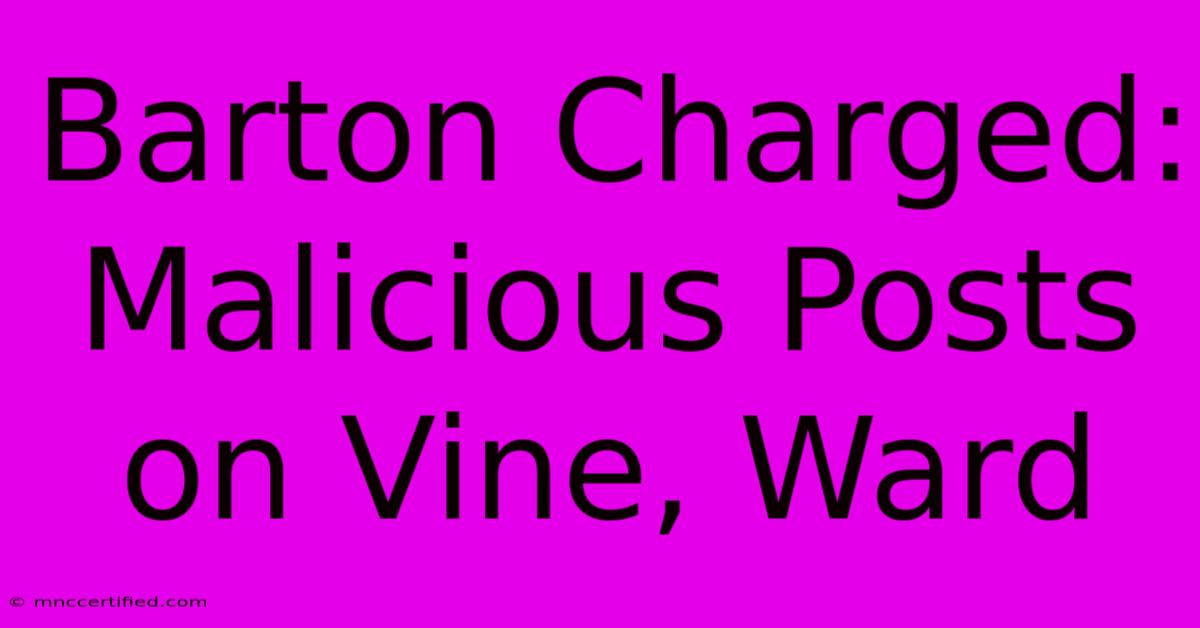Barton Charged: Malicious Posts On Vine, Ward

Table of Contents
Barton Charged: Malicious Posts on Vine, Ward — Unraveling the Case
The recent charges against Barton for malicious posts targeting Vine and Ward have sent shockwaves through the online community. This case highlights the increasingly serious legal implications of online harassment and defamation, particularly on social media platforms. Understanding the details of this case is crucial for individuals and businesses alike to navigate the complexities of online reputation management and legal responsibility.
Understanding the Allegations Against Barton
Barton faces multiple charges stemming from a series of posts on social media, specifically targeting Vine (presumably a person or business) and Ward. The accusations include:
- Defamation: The posts allegedly contained false statements that damaged the reputation of Vine and Ward. This involves proving the statements were false, published to a third party, caused harm to the reputation, and were made with at least negligence (depending on jurisdiction).
- Cyberstalking/Harassment: The charges may include persistent harassment or threatening behavior directed at Vine and Ward through online platforms. This can involve a pattern of abusive or threatening messages, even if not explicitly violent in nature.
- Violation of specific platform terms of service: Social media platforms like X (formerly Twitter) and others often have strict terms of service prohibiting harassment, hate speech, and other forms of malicious content. Barton's actions might have violated these terms, leading to separate legal action from the platform itself.
Key Evidence: The prosecution will likely rely on screenshots of the posts, witness testimonies (from Vine and Ward, and potentially others who saw the posts), and potentially digital forensic evidence tracing the posts back to Barton.
The Legal Implications of Online Malicious Posts
This case serves as a stark reminder of the legal ramifications of online actions. Freedom of speech is not absolute, and it does not protect malicious statements intended to harm the reputation or well-being of others. The line between protected speech and actionable defamation or harassment is often blurry, making it essential to understand the relevant laws in your jurisdiction.
Consequences for Barton could include:
- Fines: Substantial financial penalties for the damages caused.
- Jail time: Depending on the severity of the charges and the jurisdiction.
- Civil lawsuits: Vine and Ward could pursue separate civil lawsuits for damages, potentially leading to additional financial penalties.
- Reputational damage: Even if acquitted, Barton's reputation will likely be severely tarnished.
Navigating the Digital Landscape Responsibly
This case underscores the importance of responsible online behavior. Here are some key takeaways for individuals and businesses:
- Think before you post: Carefully consider the potential consequences of your online communications. Avoid making false statements, engaging in personal attacks, or spreading misinformation.
- Understand the law: Familiarize yourself with defamation laws and online harassment laws in your area.
- Monitor your online reputation: Regularly check your online presence for potentially damaging content.
- Develop a social media policy: Businesses should implement clear policies outlining acceptable online behavior for employees.
- Report abuse: Report instances of online harassment or defamation to the relevant platform and authorities.
The Future of the Case and Its Impact
The outcome of Barton's case will significantly impact future legal precedents regarding online harassment and defamation. The trial will likely delve into the specifics of the posts, the intent behind them, and the extent of the harm caused. The judgment will influence how similar cases are handled in the future, setting a precedent for online accountability. This case should serve as a cautionary tale, emphasizing the need for responsible and ethical online engagement. We will continue to update this article as the case progresses.
Keywords: Barton, malicious posts, Vine, Ward, defamation, cyberstalking, online harassment, social media, legal implications, online reputation, freedom of speech, digital responsibility, legal precedent, online accountability.

Thank you for visiting our website wich cover about Barton Charged: Malicious Posts On Vine, Ward. We hope the information provided has been useful to you. Feel free to contact us if you have any questions or need further assistance. See you next time and dont miss to bookmark.
Featured Posts
-
Government Rejects Waspi Womens Claims
Dec 18, 2024
-
Mc Gregor Confirms India Fight With Paul
Dec 18, 2024
-
Ripples Rlusd Global Exchange Listings
Dec 18, 2024
-
Basketball Star Janis Timma Dies Anna Sedokova Mourns
Dec 18, 2024
-
Vanuatu Earthquake Death Toll To Increase
Dec 18, 2024